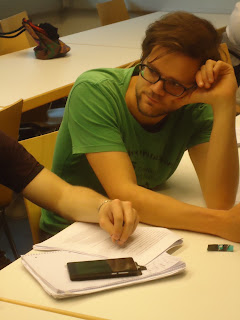LMU students develop refugee stories
(Munich, Germany)-It’s natural to get butterflies in your stomach when you meet, and talk to, refugees for the first time.
That’s exactly the feeling experienced by my peace journalism workshop students this week at Ludwig-Maximilians-Universität (LMU). The students were tasked with interviewing refugees and producing a peace journalism style story (or at least, getting the story started).
Several student reporters went to a refugee camp here in Munich, only to be predictably denied entry. Unable to enter the camp, they talked to the refugees, a mix of Syrians and others, who were lingering outside the camp’s fences.
Most of the students came back to class with good interviews, and a promising start to a professional story. One story will be about a German who volunteers to help refugees, offering them tea and sage advice about life in Germany. Another story will highlight the four month perilous journey of a Somalian family, including an infant, to Munich. A third story will be an interesting tale of a residence where German college students live side-by-side with 16-19 year old refugees. Another report will be about an NGO that dispenses legal advice to refugees.
These story topics, and the students’ discussions about their reporting, reflect an understanding of the peace journalism model of refugee reporting—a style that encourages counter-narrative, balanced, and empathetic storytelling that helps to show refugees in a different light while building bridges between refugees and host communities.
As the right-wing political pressure against refugees mounts here in Europe, it’s reassuring to know that responsible stories about displaced persons will continue to be told by these budding journalists.
(Munich, Germany)-It’s natural to get butterflies in your stomach when you meet, and talk to, refugees for the first time.
 |
| Hard at work at LMU peace journalism workshop |
That’s exactly the feeling experienced by my peace journalism workshop students this week at Ludwig-Maximilians-Universität (LMU). The students were tasked with interviewing refugees and producing a peace journalism style story (or at least, getting the story started).
Several student reporters went to a refugee camp here in Munich, only to be predictably denied entry. Unable to enter the camp, they talked to the refugees, a mix of Syrians and others, who were lingering outside the camp’s fences.
 |
| PJ workshop, LMU, Munich, Germany |
Most of the students came back to class with good interviews, and a promising start to a professional story. One story will be about a German who volunteers to help refugees, offering them tea and sage advice about life in Germany. Another story will highlight the four month perilous journey of a Somalian family, including an infant, to Munich. A third story will be an interesting tale of a residence where German college students live side-by-side with 16-19 year old refugees. Another report will be about an NGO that dispenses legal advice to refugees.
These story topics, and the students’ discussions about their reporting, reflect an understanding of the peace journalism model of refugee reporting—a style that encourages counter-narrative, balanced, and empathetic storytelling that helps to show refugees in a different light while building bridges between refugees and host communities.
As the right-wing political pressure against refugees mounts here in Europe, it’s reassuring to know that responsible stories about displaced persons will continue to be told by these budding journalists.
No comments:
Post a Comment